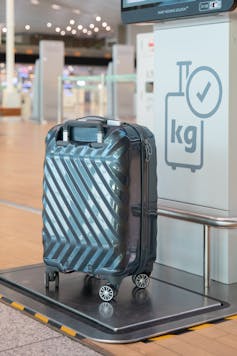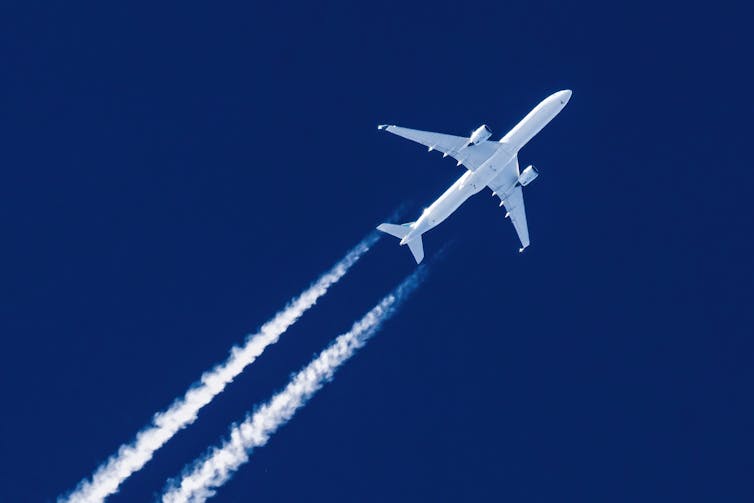Denis Tolkach, James Cook University and Stephen Pratt, University of Central Florida
Imagine checking in for a flight with your two teenage children. At the counter, you are told that your youngest teenager’s suitcase is two kilograms over the limit. You get slapped with a $75 penalty for their excess luggage.
This penalty feels arbitrary and unfair. The youngest weighs about 45kg, and their luggage weighs 25kg, making their total payload on the flight 70kg.

Their older sibling, on the other hand, weighs 65kg, and has brought 23kg of luggage to check in. Their total weight is higher – 88kg – yet they receive no penalty.
Obviously, things aren’t that simple. Charging passengers based on their weight is highly controversial for many reasons. But that hasn’t stopped some airlines experimenting with such policies.
Imagine checking in for your flight only to have the staff tell you to purchase an extra seat as you are a plus-size passenger. You feel discriminated against because you are using the same service as other passengers and your weight is beyond your control.
But despite the lived experience of many and hot debate in the media, there has not been a formal study into what passengers themselves think about this matter.
Our recently published research examined air passengers’ views on alternative airfare policies to understand whether the public finds them acceptable and what ethical considerations determine their views.
Though we found a range of ethical contradictions, most travellers were guided by self-interest.
A controversial but important topic
The issue of whether airlines should weigh passengers is an ethical minefield with no easy answers.
Despite its sensitivity, the aviation industry can’t ignore passenger weight. Airlines intermittently undertake passenger weight surveys as they need to accurately calculate payload to ensure flight safety and estimate fuel consumption.
The evidence shows passengers are getting heavier. Airlines including the now-defunct Samoa Air and Hawaiian Airlines have taken things one step further and experimented with weighing passengers regularly.
Samoa Air, for example, became the first airline to introduce a “pay-as-you-weigh” policy, where the cost of your ticket was directly proportional to the combined weight of you and your luggage.
In contrast, Canada has now long had a ‘one person, one fare‘ policy. It is prohibited and deemed discriminatory to force passengers living with a disability to purchase a second seat for themselves if they require one, including those with functional disability due to obesity.
To complicate matters further, the issue of passenger and luggage weight is not only ethical and financial, but also environmental. More weight on an aircraft leads to more jet fuel being burnt and more carbon emissions.
About 5 per cent of human-driven climate change can be attributed to aviation, and the industry faces enormous pressure to reduce fuel consumption while it waits for low carbon substitutes to become available.

What do passengers actually think?
To get a better sense of how the public actually feels about this issue, we surveyed 1012 US travellers of different weights, presenting them with three alternatives:
- standard policy – currently the most widely used policy with passengers paying a standard price, irrespective of their weight
- threshold policy – passengers are penalised if they are over a threshold weight
- unit of body weight policy – passengers pay a personalised price based on their own body weight, per each pound.
The standard policy was the most acceptable for participants of differing weight, although the heavier the passenger, the more they preferred the standard policy. This can be partially explained by status quo bias. Generally, people are likely to choose a familiar answer.
The threshold policy was the least acceptable. This policy was seen to violate established social norms and be generally less fair.
The unit of body weight policy was preferred to the threshold policy, although participants raised concerns about whether it would be accepted by society.
Perhaps unsurprisingly, we found that self-interest played a clear role in determining whether respondents considered a policy acceptable.
Younger, male, financially well-off travellers with lower personal weight generally found the alternative policies more acceptable.
An ethical conflict
Alternative airfare policies that are based on passenger weight bring environmental and ethical concerns into conflict. Obviously, the effect isn’t from any one traveller, in particular, but averages over the entire industry.
Interestingly, respondents that were more concerned about the environment – ‘ecocentric’ – preferred air fare policies that would reduce the carbon emissions. This made them more open to the controversial alternatives.
While the threshold policy was clearly rejected by many respondents as discriminatory, environmental concern played a role in the level of acceptance of the unit of body weight policy.
It’s important to apply a critical lens here. These ecocentric travellers were also generally younger and had lower personal weights, so many would benefit from the alternative policies financially.
For policymakers overall, our study suggests when it comes to controversial ticketing policies, the public is more likely to be swayed by self-interest than anything else.
Denis Tolkach, Senior Lecturer, James Cook University and Stephen Pratt, Professor, University of Central Florida
This article is republished from The Conversation under a Creative Commons licence. Read the original article.
Would you be happy to ‘pay your weigh’ when flying? Why not share your thoughts in the comments section below?
Also read: Astonishing NZ entry tax hike + new European travel fee


All passengers should be weighed regardless of ticket cost. The average weight method is not good enough for safety & avgas calculation. CofG for an aircraft effects the trim & is critical. Therefore distribution of weight is also important.
I think passengers who are so overweight that they occupy two seats should pay for them.
This would only be about 1% of flyers. Either that or be made to fly business class where the seats are bigger.
After experiencing a couple of extremely uncomfortable flights where plus sized couples split their seat allocation so they were either side of me because they didn’t like to sit together! I wonder why? I now fly rarely and only when I can afford Business class. People who are that large should buy two seats or go Business. Or go Low Carb!!
I think would be fairer if airlines used the combined weight of the person and their luggage up to a certain weight and then charge an ‘excess’ fee thereafter. I agree with Teeto27 why should I have my space invaded by people who take up more than than their seat because of their weight? I the same goes for clothing. I’m a size 6 but pay the same size for clothes as someone who is size 26, despite the fact that my clothes probably use half as much fabric. Most things in society have a ‘user pays’ mentality, why not airlines?
Sorry for the typos didn’t proof read well enough. I meant ‘it’ would be fairer, and same ‘price’ not size. :{
Julie has a point that is essentially fair. A nominal Fare based on the combined passenger plus luggage weights for a Fare adjustment.
Highlander adds that a point of concern for the smaller sized regional airliners is that the CoG of the aircraft can be taken outside it’s safe balance if we have a cluster of overweight passengers at the back of the cabin and the slim travelers up front. (This situation has caused crashes in the past with tragic results.)
Samoan Air was an inter-island service with modest aircraft that found that a typical islander was well over the nominal average and could not fit two passengers to fit side by side. Also with a full complement of these passengers, there were times that the all up weight was so marginal that fuel would have to be off loaded so that the plane could actually take off and climb above the waves.
In reality, 5% of human caused climate change is less than negligible so anyone who believes that it would make a difference has taken the koolaid.
And yes, we can be responsible for our weight. It may not be easy, but it is possible to lose excess weight. In the airliners (and our cars), the seats are designed for a nominal weight and proportion and anyone outside this may find that the strength of the seat structure, seat belts (including their fastening to the frame) and airbags do not give full protection in a crash.
Why are so many passengers allowed to enter the airplane with numerous bags of hand luggage. Back packs, large shoulder bags and canvas carry on bags and small suitcases. The overhead cabins are filled up very quickly and many other passengers have their one small carryon stored 10 rows behind them. This is not ideal. Is this laziness by staff when checking in passengers?
The question that needs asking, does it matter? I remember when hand luggage was allowed up to 12 kg, now it’s 7kg. Have the new planes gotten cheaper built not able to hold the additional weight? What is the impact of weight on the plane’s fuel consumption? If so, then it would make sense to weigh passenger including all his luggage when checking in and setting a limit.